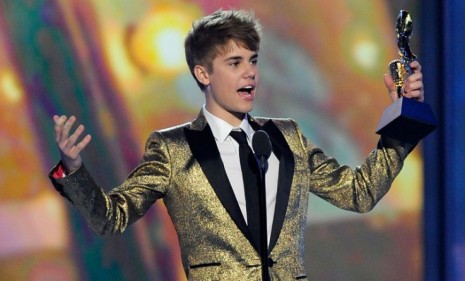What happened to all the 'next Justin Biebers'?
A slew of passably mop-topped candidates have been hyped as successors to the 17-year-old pop star — and then, mysteriously, all but disappeared

A free daily email with the biggest news stories of the day – and the best features from TheWeek.com
You are now subscribed
Your newsletter sign-up was successful
It seems each week, another precocious, strategically coiffed tween becomes a YouTube sensation and is crowned "the next Justin Bieber." That's no surprise, says Jason Richards at The Atlantic. Successful pop stars inevitably inspire imitators. The Backstreet Boys spawned *NSYNC, 98 Degrees, and others. Britney Spears was quickly replicated with Christina Aguilera, Jessica Simpson, and Mandy Moore. But that hasn't happened with the Biebs. The 17-year-old's nearly 4 million album sales, $70 million movie gross, and manic fandom (so far) stand alone. Why? Here, four theories:
1. The media can't make fans fall in love
When it came to boy bands, fans could crush on a range of members. "It's harder for a boy as a solo artist," says Seventeen's Entertainment Director Carissa Rosenberg Tozzi, as quoted by The Atlantic. "You really have to fall in love with [him alone]." Fans clearly feel that Bieber has "peerless" appeal. So to most fans, Ellen DeGeneres' promotion of the latest would-be Bieber is the media version of "parents suggesting who they should date," says Richards.
The Week
Escape your echo chamber. Get the facts behind the news, plus analysis from multiple perspectives.

Sign up for The Week's Free Newsletters
From our morning news briefing to a weekly Good News Newsletter, get the best of The Week delivered directly to your inbox.
From our morning news briefing to a weekly Good News Newsletter, get the best of The Week delivered directly to your inbox.
2. No one owns Twitter like the Biebs
Fan engagement through Twitter is a de facto PR move among rising artists today, says Amos Barshad at New York. But Bieber was the pioneer. Early on, he was direct messaging fans on the social networking site, says Rosenberg, making each one "really feel special." Plus, his management team was "cleverer than the rest of the competition," says Barshad. Bieber wasn't just directly engaging his fans, his team was publicizing the efforts, creating an impressive "perception of open communication" that the public latched onto.
3. The more popular Bieber gets, the harder it is for anyone to catch up
A simple principle of economics explains Bieber's popularity, says Adrian Chen at Gawker. According to the network effect, the more people who use a service — think Facebook — "the more valuable it is to users, and the harder it will be for any competitor to usurp." Bieber, with his micro-gossip blogs and staggering 10 million Twitter followers, has so much momentum, power and value, that he's become virtually unstoppable.
A free daily email with the biggest news stories of the day – and the best features from TheWeek.com
4. Bieber is the king of branding
Credit the painstaking effort with which Bieber developed the "Justin Bieber" brand, says Allen Adamson at Forbes. He built his fan base by hitting the pavement — mall tours, radio interviews — all while staying on message. "Brands that succeed stick to the basics… and never veer from what they want to stand for." Everything from his hair style to his PR is carefully planned out, knowing that "one missed detail" could make "non-Beliebers out of his fans." His competition simply may not be up to the task.
-
 Political cartoons for February 3
Political cartoons for February 3Cartoons Tuesday’s political cartoons include empty seats, the worst of the worst of bunnies, and more
-
 Trump’s Kennedy Center closure plan draws ire
Trump’s Kennedy Center closure plan draws ireSpeed Read Trump said he will close the center for two years for ‘renovations’
-
 Trump's ‘weaponization czar’ demoted at DOJ
Trump's ‘weaponization czar’ demoted at DOJSpeed Read Ed Martin lost his title as assistant attorney general